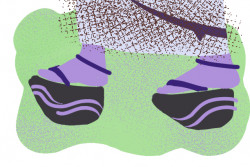
Originally published on metropolis.co.jp on November 2011

Dear Metropolis,
I will warn you in advance that what follows is a somewhat nasty letter, but I am greatly disheartened and disappointed by your most recent issue, and I feel the need to speak my mind. This letter is going to be too long to print in your “Metropolis Mediabox” half-page (I imagine that I’ve already gone over the character limit), but I have a feeling that many other readers are going to submit something similar in a more publishable form. That’s okay—I do hope that you still read this letter in its entirety and take its message to heart.
In your November 4th issue, you ran an article about the “expat wives” of Tokyo, which offered an extremely scathing look at foreign women who come to Japan to be with their husbands who are transferred here for work. The article referred to these women as “EWs” and depicted them as petty, superficial, lazy, stupid, pathetic women whom should be the object of ridicule for all of those around them. However, the article was written by a woman, a self-proclaimed “EW” at that, so I assumed it was an attempt at some light-hearted, tongue-in-cheek self-deprecation. The article also told me to tune in two-weeks later for a story about the “Stay-At-Home Dads of Tokyo,” which I expected would offer an equally-mocking look at the EW’s male counterpart.
A few days ago I picked up the newest issue of Metropolis from the lobby of the hotel in which I’m staying. I flipped straight to the article about Stay-At-Home-Dads (“SAHDs”), hoping to get a laugh at the expense of those shlubs who milk off the teets of their sugar mamas. What I found instead was a heartwarming human interest story about those noble fathers who spend all of their free time volunteering or bonding with their kids. It was a well-written article, don’t get me wrong, but the fact that it was juxtaposed as the counterpart to the “EW” article brings out a very unfortunate double-standard. What I gathered from this is that a woman who comes to Japan to be with her husband while he works in a stuck-up, gold-digging bitch, whereas a man who comes to Japan to be with his wife is a sweet, charming family-man.
Let’s take a closer look at the differences between the two articles, shall we?
· The EW article was written by a woman who claimed to be an EW, which gave her some license to make a mockery of her own kind. The SAHD article was also written by a woman, who was not about to be cruel to a group in which she does not associate. Would it have been that difficult to find a self-deprecating SAHD to write an article on the same level as the EW article?
· The EW article featured a drawing of skinny foreign women meeting at coffee shops and riding in taxis—because from your article, apparently that’s all foreign wives in Japan do. The SAHD article featured photographs of foreign men playing at home with their kids—because from your article, apparently that’s all foreign husbands in Japan do.
· The SAHD article included interviews with various named SAHDs, giving thoughtful quotes that gave personal insights into their lives. The EW article included no names or interviews—because presumably all foreign wives in Japan are exactly the same so there’s no need to include individual stories.
· The SAHD article barely mentions what the working wives—who are proving that women can succeed in Japan—are doing to earn the money that allows the SAHDs to live in expensive Tokyo in the first place. There is one tiny mention of a wife in the article—she works in the Australian embassy. Contrast this with the EW article, whose husbands are employed by “major corporations, embassies or banks” and are “big swingers” who often have to go on yet “another business trip.” Thus, Metropolis reminds us that achieving professional monetary success is really a man’s thing.
· On a similar note, EWs apparently don’t mind not working because “money is not an issue for this lucky lot,” whereas SAHDs “miss working” and “miss the day-to-day experience of going somewhere, being productive, the personal development and the contact with colleagues.” Clearly, the reason men are successful at work and women are not is because men work to make themselves better people, whereas women are only interested in money, whether they make it themselves or have a husband who can make it for them.
· The EW article taught me that the Tokyo American Club (which I had never heard of before) was a swanky social club for bored, rich, snobby women to go for eating, drinking, playing and partying. The SAHD article taught me that the Tokyo American Club is an accepting club that helps men shake off the stress of being homeroom parents by organizing trips to Mt. Fuji.
· For EWs, children are a burden, whose drop-off and pick-up schedules bookend the EWs day, for whom the EW grudgingly goes shopping and attends Parents’ Association meetings, and whom the EW will happily leave behind at the Tokyo American Club while she gets her nails done. On the other hand, being an SAHD gives men a “tighter bond with their children,” as they “embrace their roles” as fathers and learn to be “nurturing and affectionate.”
· EWs spend their days going to the salon, going shopping for designer clothes, eating at the most expensive restaurants on their husbands’ dimes, getting spray tans and planning holidays—you know, doing those things that all girls just love to do. SAHDs spend their days volunteering, starting homeless shelters, participating in neighborhood associations, and getting involved in the PTA (note that for the SAHD, the PTA provides a “much-needed connection with adults” whereas for the EW, “there are only so many Parents’ Association meetings one can go to without completely losing one’s will to live.”)
As a single man, one may say that my opinion here doesn’t count, but I’ve observed enough to know that neither of these articles offer the unvarnished truth. I am currently working in a large foreign company, and I have a number of successful male and, yes, successful female coworkers, many of whom are married to “EWs” and “SAHDs.” None of the EWs are remotely as vapid as the EWs depicted in the article, and none of the SAHDs are nearly as noble as Khanh Pham, Primoz Klemencic and the other SAHDs you managed to find. I was waiting for the part about the SAHD who called over the floozie he met at a Roppongi club during the day for a quick nooner while the misses was making money and junior was at school, but I guess you didn’t interview him, for whatever reason.
So what did I learn from your two articles? If a woman has a rich husband, her main desire in life is to spend his money. If a man has a rich wife…er…a wife working in Tokyo (because let’s not be silly, clearly women can’t be rich), his main desire in life is to be a better husband, father, and member of his community. The fact that you chose to run an article mercilessly insulting foreign housewives is bad enough in and of itself, but framing it as harmless humor made it forgivable. However, once you decided that the most appropriate “follow-up” was an article depicting foreign househusbands as paragons of virtue, you effectively made it clear that there exists a double standard at Metropolis: women are to be mocked for being women, men are to be praised for being men. Clearly you’ve been in Japan too long; you seem to have forgotten that in some countries, women are actually respected.
Metropolis, you can start by apologizing to the expat wives of Tokyo. Then you need to apologize to women in general.
Sincerely,
Jacob K.
Got anything to say? Post your comments below.







